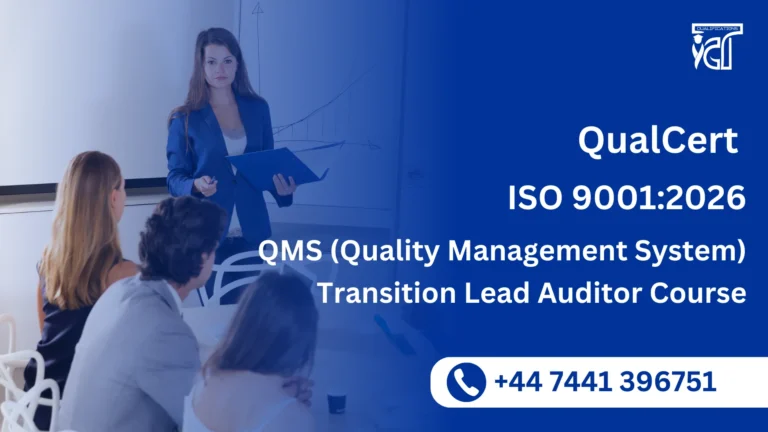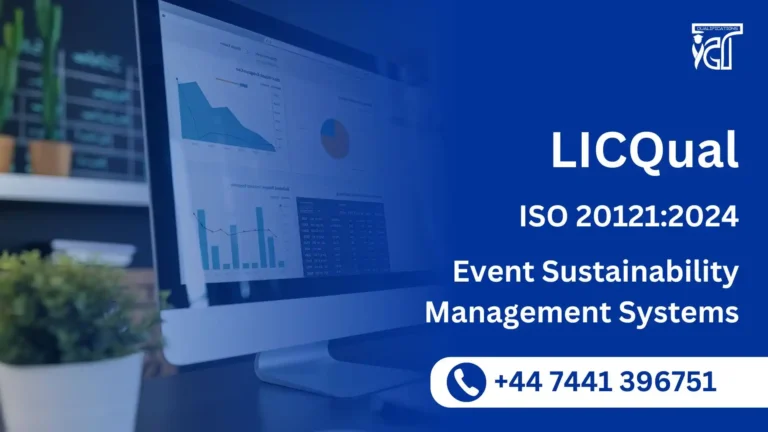In today’s dynamic and uncertain business environment, effective risk management is critical for organizational success. The LICQual ISO 31000:2018 Risk Management Lead Auditor qualification empowers professionals to lead risk audits, assess risk frameworks, and contribute to robust corporate governance. This internationally recognized program is regulated by Ofqual, the UK’s official qualifications authority, and is delivered through an entirely assignment-based format, making it ideal for working professionals seeking a flexible and rigorous learning experience.
ISO 31000:2018 is the global standard for Risk Management, offering principles, frameworks, and processes for managing risk in a systematic, transparent, and credible manner. It applies to organizations of all sizes and sectors, helping them to identify, evaluate, and mitigate potential risks that could hinder strategic goals.
The LICQual ISO 31000:2018 Risk Management Lead Auditor course is a comprehensive, Ofqual-regulated qualification designed to develop the expertise needed to conduct, manage, and lead audits of risk management systems in accordance with the ISO 31000:2018 international standard.
This qualification is ideal for professionals aiming to enhance their skills in risk auditing, governance, and enterprise risk management, and is delivered entirely through assignment-based assessment, allowing for maximum flexibility and practical application.
The LICQual ISO 31000:2018 Risk Management Lead Auditor qualification bridges the gap between theoretical understanding and practical application of risk management auditing. With its assignment-based approach and Ofqual-regulated status, it provides learners with a flexible yet robust path to becoming certified lead auditors. Whether you’re advancing in your current role or exploring new professional opportunities, this course is your strategic move towards leadership in risk management.
The LICQual ISO 31000:2018 Risk Management Lead Auditor qualification is a strategic choice for professionals who want to lead with confidence in today’s risk-sensitive business environment. Regulated by Ofqual and delivered through a flexible, assignment-based structure, this course equips learners with practical auditing skills, in-depth knowledge of ISO 31000:2018, and a globally recognized certification.
Whether you’re looking to enhance your existing role, transition into risk management, or expand your consulting capabilities, this qualification provides a credible and career-defining advantage. As organizations increasingly prioritize risk governance and compliance, certified lead auditors are in high demand—and this course positions you to meet that demand with authority and expertise.
LICQual ISO 31000:2018 Risk Management Lead Auditor
Mandatory units
| Sr# | Unit Title | Credits | GLH |
|---|---|---|---|
| 1 | Understanding ISO 31000:2018 Risk Management Framework | 8 | 24 |
| 2 | Risk Assessment Methodologies and Techniques | 8 | 24 |
| 3 | ISO 31000:2018 Risk Management Process Integration | 6 | 18 |
| 4 | Planning and Conducting Risk Management Audits | 6 | 18 |
| 5 | Risk Management Leadership and Decision-Making | 6 | 18 |
| 6 | Reporting and Corrective Actions in Risk Management Audits | 6 | 18 |
GLH (Guided Learning Hours) and TQT (Total Qualification Time) are terms commonly used in vocational qualifications to help define the amount of time a learner is expected to spend on heir studies.
1. GLH (Guided Learning Hours)
GLH refers to the number of hours a learner spends being directly taught, supervised, or supported during their course. This includes the time spent in activities such as:
- Classroom instruction
- Practical workshops
- One-on-one tutoring or mentoring sessions
- Online learning sessions with tutor support
In other words, GLH represents the time that learners are actively engaged with their instructors or learning activities.
2. TQT (Total Qualification Time)
TQT represents the total amount of time a learner is expected to invest in completing a qualification, including:
- GLH (Guided Learning Hours): Time spent on direct learning, as explained above.
- Self-Directed Learning: This includes time spent on independent study, research, assignment completion, preparation for exams, and any other work the learner does outside of direct teaching hours.
TQT is a broader measure that includes all the time required to achieve the qualification. It helps learners and employers understand the overall commitment required for the qualification.
Key Differences Between GLH and TQT:
- GLH focuses on direct learning with guidance or supervision.
- TQT includes GLH as well as independent study time and other learning-related activities.
Example:
If a qualification has a TQT of 600 hours and a GLH of 250 hours, it means the learner should spend 250 hours in direct learning (classroom, online, or tutor-led sessions) and 350 hours on independent study or research.
Learning Outcomes of LICQual ISO 31000:2018 Risk Management Lead Auditor
Understanding ISO 31000:2018 Risk Management Framework
- Demonstrate a comprehensive understanding of the ISO 31000:2018 risk management framework, including its principles, structure, and terminology.
- Analyze how ISO 31000 can be applied to various organizational contexts to enhance risk management practices.
- Identify the key elements of an effective risk management system based on ISO 31000:2018 guidelines.
Risk Assessment Methodologies and Techniques
- Apply various risk assessment methodologies and techniques, such as risk identification, evaluation, and treatment, in alignment with ISO 31000:2018.
- Evaluate the potential risks within an organization and develop suitable strategies for risk mitigation.
- Develop proficiency in analyzing and categorizing different types of risks to support informed decision-making.
ISO 31000:2018 Risk Management Process Integration
- Integrate ISO 31000:2018 risk management processes seamlessly into existing management systems and organizational structures.
- Design risk management frameworks that align with organizational objectives and support continual improvement efforts.
- Assess the effectiveness of risk management processes within the context of an organization’s goals and operational practices.
Risk Management Leadership and Decision-Making
- Exhibit strong leadership capabilities in managing risk and fostering a risk-aware culture within an organization.
- Apply decision-making frameworks that enhance the risk management process and align with ISO 31000:2018.
- Promote proactive risk management strategies to ensure organizational resilience and sustainability.
Reporting and Corrective Actions in Risk Management Audits
- Prepare clear and actionable audit reports, documenting findings, non-conformities, and areas for improvement in risk management practices.
- Recommend appropriate corrective actions to address identified gaps in the risk management system.
- Effectively communicate audit results to stakeholders and ensure follow-up on corrective actions to enhance overall risk management processes.
Planning and Conducting Risk Management Audits
- Plan and conduct ISO 31000:2018 risk management audits, ensuring compliance with international standards.
- Apply audit techniques to evaluate the effectiveness of risk management systems, identifying strengths and areas for improvement.
- Provide objective assessments and actionable insights to support organizational risk management goals and compliance with ISO 31000:2018.
The LICQual ISO 31000:2018 Risk Management Lead Auditor course offers a comprehensive and practical learning experience that equips professionals with the skills to assess, manage, and audit risk management systems effectively. This certification enhances your expertise in risk management, improves your auditing capabilities, and opens up numerous career advancement opportunities. Participants gain global recognition, credibility, and the confidence to contribute meaningfully to organizational success.
1. Enhanced Risk Management Skills
One of the primary benefits of the LICQual ISO 31000:2018 Risk Management Lead Auditor course is the development of advanced risk management skills. Participants gain a thorough understanding of the ISO 31000:2018 standard, including risk management principles, frameworks, and the process of integrating risk-based thinking into decision-making. This knowledge equips learners to proactively identify, assess, and manage risks within their organization, improving overall risk governance.
2. Expertise in Auditing and Compliance
By completing this course, learners acquire a comprehensive skill set in auditing risk management systems in line with ISO 31000:2018. The course focuses on the role of the lead auditor, providing the knowledge needed to lead and conduct audits independently. Understanding the principles of auditing, audit planning, execution, and reporting ensures that learners are fully prepared to carry out detailed, efficient audits, and provide recommendations for improvement. This expertise enhances their ability to ensure compliance with ISO standards and other regulations relevant to their organization.
3. Career Advancement Opportunities
Holding a certification in ISO 31000:2018 as a Lead Auditor adds significant value to a professional’s career profile. It demonstrates a high level of expertise and commitment to quality, risk management, and governance. This qualification opens up opportunities for career advancement, whether through promotions, new roles, or better job prospects. Professionals who complete this course are seen as leaders in their field, capable of managing risk audits and improving organizational practices.
4. Global Recognition and Credibility
ISO 31000:2018 is recognized internationally as the benchmark for risk management practices. Obtaining certification as a Lead Auditor in this standard enhances the learner’s professional credibility, as it signifies a strong understanding of global best practices. Whether you are in a local, regional, or international market, this qualification is highly regarded and can be leveraged for opportunities across different industries, enhancing both personal and organizational reputation.
5. Improved Organizational Risk Management
Professionals trained in ISO 31000:2018 are better equipped to contribute to the overall risk management strategy of their organization. With this qualification, they can lead the implementation of risk management frameworks that align with ISO 31000:2018 standards, ensuring the organization systematically identifies, evaluates, and mitigates risks. This structured approach improves decision-making, reduces operational disruptions, and strengthens the organization’s resilience to both internal and external challenges.
6. Networking and Professional Development
The course provides opportunities for networking with other professionals in risk management and auditing. Learners engage with a community of like-minded individuals, sharing insights, strategies, and experiences. Additionally, the course offers ongoing professional development by providing access to updates and discussions about changes in ISO standards, emerging risks, and best practices. This ensures that the knowledge gained is always current and relevant to industry trends.
7. Hands-on Learning and Practical Application
The course offers practical training that is directly applicable to real-world scenarios. Learners gain valuable experience through interactive case studies, role-playing, and scenario-based exercises. These activities simulate actual audit situations, allowing participants to refine their auditing skills, such as conducting risk assessments, preparing audit plans, and reporting findings. This practical experience makes them more confident and effective when performing audits in their organizations.
Summary
The LICQual ISO 31000:2018 Risk Management Lead Auditor course provides numerous benefits, including enhanced risk management skills, expertise in auditing, and career advancement opportunities. The course ensures that professionals are equipped with the tools to lead risk audits, improve organizational risk management, and contribute to overall business success. With global recognition and hands-on learning, this certification positions individuals for growth and success in the ever-evolving field of risk management.
1. Professional Background
The ideal learner for the LICQual ISO 31000:2018 Risk Management Lead Auditor course is a working professional with a background in risk management, quality management, compliance, or internal auditing. This individual typically holds a position such as Risk Manager, Compliance Officer, Internal Auditor, Quality Manager, HSE Officer, or Business Continuity Professional. Experience in sectors such as finance, manufacturing, energy, healthcare, or government is especially beneficial, where risk-based thinking and structured risk assessment are integral to operations.
2. Educational Qualifications
While there are no strict academic prerequisites, the ideal candidate usually has a degree in business administration, engineering, environmental science, finance, or a related discipline. A foundational understanding of management systems, auditing principles, and organizational processes gives the learner a significant advantage in grasping the course material.
3. Experience and Competence
A minimum of 2-3 years of relevant work experience is recommended. The learner should be familiar with the concept of risk and the importance of risk-based decision-making. Prior exposure to ISO standards, particularly ISO 9001, ISO 14001, or ISO 45001, is valuable. Experience in conducting internal or supplier audits, even informally, helps the learner better understand the role and responsibilities of a lead auditor under ISO 31000:2018.
4. Learning Objectives and Motivation
The ideal learner is motivated by a desire to enhance professional credibility and gain a recognized qualification that supports career advancement. They seek to deepen their understanding of risk management frameworks, principles, and practices, and want to be capable of leading independent risk audits within organizations. This learner is driven to contribute to organizational resilience, informed decision-making, and regulatory compliance through structured risk assessment and auditing techniques.
5. Skills and Attributes
An effective learner for this course brings strong analytical and problem-solving skills, excellent communication abilities, and keen attention to detail. They must be capable of objective judgment and critical thinking, especially when assessing organizational risks or recommending improvements. Strong interpersonal skills and the ability to work both independently and as part of a team are essential, especially when conducting interviews, writing reports, or leading audit teams.
6. Technological and Language Proficiency
The learner should be comfortable using basic digital tools for documentation, communication, and online learning platforms. As the course and its assessments are typically delivered in English, proficiency in reading, writing, and speaking English is important to ensure comprehension of the standard, successful participation in group exercises, and effective audit reporting.
Summary
The ideal learner for the LICQual ISO 31000:2018 Risk Management Lead Auditor course is a mid-career professional with a foundation in risk or compliance roles, a keen interest in advancing auditing skills, and a proactive approach to learning and leadership. With the right mindset and experience, they can leverage this course to play a vital role in strengthening their organization’s risk management framework.
Entry Requirements
To enrol in the LICQual ISO 31000:2018 Risk Management Lead Auditor candidates must meet the following entry requirements:
Register Now
Qualification Process
Qualification Process LICQual ISO 31000:2018 Risk Management Lead Auditor
- Self-Assessment:
Begin by evaluating your eligibility to ensure you meet the qualification requirements, including work experience, knowledge, and language proficiency. - Registration:
Complete your registration by submitting the required documents, including a scanned copy of a valid ID, and paying the registration fee. - Induction:
An assessor will conduct an induction to confirm your eligibility for the course and explain the evidence requirements. If you do not meet the criteria, your registration will be canceled, and the fee will be refunded. - Assignments & Evidence Submission:
Provide all assignments and the necessary evidence based on the assessment criteria outlined in the course. If you are unsure of the required evidence, consult with the assessor for guidance on the type and nature of evidence needed. - Feedback and Revision:
The assessor will review your submitted evidence and provide feedback. Evidence that meets the criteria will be marked as “Criteria Met,” while any gaps will be identified. You will be asked to revise and resubmit if needed. - Competence Evidence:
Submit final evidence demonstrating that all learning outcomes have been met. This evidence will be marked as “Criteria Met” by the assessor once it is satisfactory. - Internal Quality Assurance (IQA):
The Internal Quality Assurance Verifier (IQA) will review your evidence to ensure consistency, quality, and compliance with standards. - External Verification:
The IQA will submit your portfolio to LICQual UK Ltd External Quality Assurance Versifier (EQA) for final confirmation. The EQA may contact you directly to verify the authenticity of your evidence. - Certification:
Upon successful completion of all checks, LICQual UK Ltd will issue your official certificate, confirming that you have attained the LICQual ISO 31000:2018 Risk Management Lead Auditor







